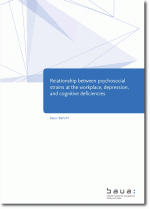Depression symptoms, burnout, work-related factors and central nervous information processing
(in German)
The present study in the framework of the international cooperation project "Depression, burnout and cognitive deficits" investigated whether healthy employees in stressful occupations who complain of depression or burnout symptoms differ from symptom free employees in self-reported state, cognitive test performance and functional brain activity. The latter was measured with event-related potentials (ERP) which can be derived from the electroencephalogram (EEG). Concerning functional brain activity the study focused on action preparation, error processing and feedback processing as key functions of the reward system. In addition general sensory and cognitive processes were compared among the groups.
Employees with symptoms of burnout or depression rated lower workability, lower internal and higher external locus of control, lower affect balance and more psycho-social strain at the workplace than employees without such symptoms. In the psychometric tests no significant performance differences were observed. Only in a very difficult task (OSPAN) employees with burnout, but not with depressive symptoms, showed a clear performance impairment compared to symptom-free employees.
In the ERP employees with (vs. without) depression symptoms exhibited a speedup of early error detection, while early sensory processing was delayed. In contrast employees with (vs. without) burnout symptoms showed an attenuation in central preparation, early error detection and late processing of negative feedback. In general, early sensory processing was enhanced, while later cognitive processes were slightly impaired in employees with burnout symptoms. The ERP results thus unveil both cognitive deficits and compensation mechanisms in employees with burnout, while overt behavior was not markedly affected.
The results might be suitable to improve the diagnosis of mild depression or burnout with the help of specific cognitive tests and EEG-based methods. In the future those methods should be used as modules of a multidimensional diagnostics, which embraces not only questionnaires and performance tests but also easy physiological measures such as ERPs. Such an objective diagnostics could help to take the complaints related to burnout more seriously as genuine disease. This could enable early occupational measures and clinical therapies, which could in turn be evaluated with those diagnostics. A prerequisite for targeted measures in the occupational framework is to identify more precisely those work-related factors that are mainly promoting burnout and depression. This will be covered by the other studies in the cooperation project.
Please download the complete report "Depression symptoms, burnout, work-related factors and central nervous information processing" (in German only).
Bibliographic information
Title: Depressive Symptomatik, Burnout, arbeitsbezogene Faktoren und zentralnervöse Informationsverarbeitung.
1. edition. Dortmund: Bundesanstalt für Arbeitsschutz und Arbeitsmedizin, 2018. pages: 119, Project number: F 2318, PDF file, DOI: 10.21934/baua:bericht20180920


